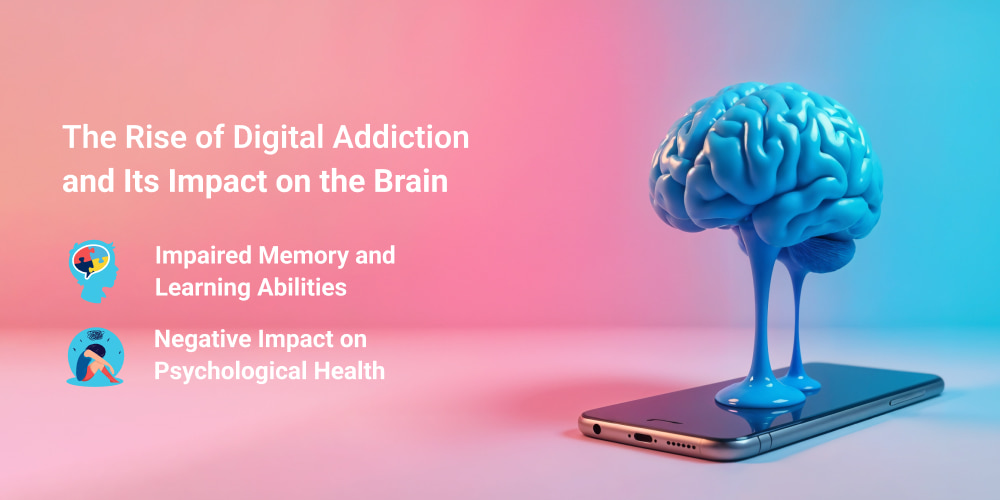We use phones, tablets, and computers all the time, spending hours looking at screens. This is called “technology overuse.” Kids and teens especially are spending more time online. But too much screen time might not be good for the brain.
Our brain grows and changes as we learn. This is “cognitive development.” If kids spend too much time on screens, it might affect how their brains learn and grow. They might have trouble paying attention or remembering things. Also, too much technology might change how their brains work, affecting their health.
In this article, we will explore how using too much technology can change our brains and the way we think.
The Rise of Digital Addiction and Its Impact on the Brain
These days, it’s easy to get hooked on our phones and computers. It’s called “digital addiction.” It’s like being addicted to anything else. We want to use it all the time, even when we know we shouldn’t. Using too much technology, or “technology overuse,” can change how our brains work. Now, let’s look at this in detail.
How Excessive Screen Time Affects Memory and Learning
When we spend too much time looking at screens and develop digital addiction, it can make it harder to remember things and learn. This is because our brains need time to make memories. If we’re always looking at screens, our brains don’t get that time.
For example, our attention span can get shorter. We might find it hard to listen to a teacher or read a book. We might also forget things we just learned. Also, our brains might not be as good at switching between different tasks. This is called “cognitive flexibility.” It’s like our brains get stuck on one thing and can’t move on to the next. This technology overuse affects cognitive development and makes it harder for our brains to learn new things and remember old ones.
The Link Between Technology Overuse and Mental Well-Being
Spending too much time on our phones and computers can also make us feel sad, worried, or stressed. Our mental well-being can get worse.
When we’re always connected to the internet, we might feel like we have to check our phones all the time, making us feel anxious. We can also see things online that make us feel bad about ourselves. Social media can make us feel like everyone else is having a better time than us. And digital addiction can make it hard to relax and enjoy real life.
Also, looking at screens before bed can make it hard to sleep. Not getting enough sleep can make us feel tired and grumpy. This can lead to depression and more stress. Tech overuse can create a cycle where we feel bad, use technology to feel better, and then feel even worse. It’s important to find a balance and take breaks from screens to take care of our minds.
The Neurological Consequences of Technology Overuse: What the Experts Say
Neuroscientists and brain specialists study the effects of technology overuse. They’ve studied how our brains change when we spend a lot of time on screens.
Experts describe our brains as plastic, meaning they can change and adapt. This ‘neuroplasticity’ allows for creating new connections in the brain. But, technology overuse can mess with this process.
Imagine your brain has roads, or ‘neural pathways,’ that help messages travel. When we do something a lot, like play video games or scroll through social media, those roads get really strong. But others, like the ones for focusing or remembering things, might get weak.
Experts have seen that people who use a lot of technology can have trouble with things like paying attention. Their brains might not be as good at switching between tasks. They might also have trouble remembering things they learned. This means their cognitive development is also affected. It’s like their brains aren’t growing and learning as well as they should.
Other experts also worry about how too much screen time changes how our brains work overall. They’ve found that some parts of the brain might get smaller or less active. This can affect things like our ability to control our emotions or make good decisions.
They also emphasize that “neurological health” is a big concern. Too much screen time can lead to problems. Those include headaches, eye strain, and trouble sleeping. These problems can affect how well our brains function throughout the day.
The experts say it’s not just about how much time we spend on screens but also what we’re doing. Things like playing fast-paced video games or checking social media can be especially harmful to our brains.
They tell us that it’s important to take breaks from screens and do other things that help our brains grow, like reading, playing outside, or talking to friends and family. They want us to understand that while technology can be helpful, it’s important to use it in a healthy way.
Strategies for Protecting Cognitive Health in a Digital World
First, let’s talk about “digital detox.” This means taking breaks from all your screens. You can start small, like turning off your phone for an hour or two each day. Try to find other things to do, like reading a book, going for a walk, or playing a game with friends. You can also try a longer detox, like a weekend without screens. This can help your brain rest and recharge.
We need to be ‘mindful’ about our screen time to protect our cognitive development. This means paying attention to how much time we spend on our devices and what we’re doing. Set limits for yourself. For example, you can decide to only check your phone at certain times of the day or to not use screens after a certain time at night. You can also use apps that track your screen time and help you set goals.
Physical activity is also very important for brain health. When you exercise, your brain gets more blood and oxygen, which helps it work better. Try to do at least 30 minutes of exercise most days of the week. You can go for a run, ride your bike, play a sport, or just dance around your room.
Getting enough sleep is also crucial for neurological health. When you sleep, your brain cleans itself and makes new connections. Try to go to bed and wake up at the same time every day, even on weekends. Make sure your bedroom is dark, quiet, and cool. Avoid using screens before bed, as the blue light can make it hard to fall asleep.
Spending time with friends and family is also important for mental well-being. Social interaction helps the brain stay active and healthy. Try to spend time with people in person rather than just online. Have conversations, play games, and laugh together.
Learning new things can also help keep your brain sharp. Try learning a new language, playing a musical instrument, or taking a class. This will challenge your brain and help it grow.
Finally, remember to be kind to yourself. It’s okay to use technology, but it’s important to find a balance. By taking these steps, you can protect your brain and enjoy a healthy relationship with technology.
Balancing Technology Use: Is It Possible to Stay Healthy in a Digital World?
Yes, it is possible to use technology and stay healthy! We just need to find a good balance. It’s not about giving up our phones and computers completely but about using them in a smart way.
One big thing is to know when to stop. If you notice you’re spending too much time on screens, take a break. Set rules for yourself, like no phones during meals or before bed. These rules can help you control technology overuse.
Another important thing is to do other things besides using screens. Go outside! Play games with friends. Read books. Do things that don’t involve a screen. These offline activities are important for healthy cognitive development. They help our brains grow and learn in different ways.
Think about how you use technology. Are you just scrolling through social media, or are you learning something new? Using technology to learn or create things is better than just wasting time. Find apps or websites that teach you something new, or use technology to make art or music.
Remember, our mental well-being is important too. If you feel sad, angry, or stressed after using technology, take a break. Talk to someone you trust, and don’t let technology control your feelings.
It’s also good to have “screen-free” times. Maybe you have a day each week where you don’t use any screens at all. Or maybe you have a few hours each day where you turn everything off. This can help you relax and connect with the real world.
As for parents, they can set good examples by putting their own phones down. Schools can teach kids about digital safety and how to balance screen time.
We live in a world where technology is everywhere. We can’t avoid it. But we can learn to use it in a way that helps us, not hurts us. By being mindful and making good choices, we can avoid digital addiction and stay healthy.













Please, leave your review
Write a comment: